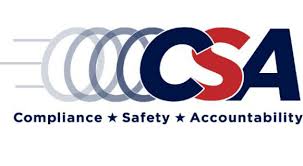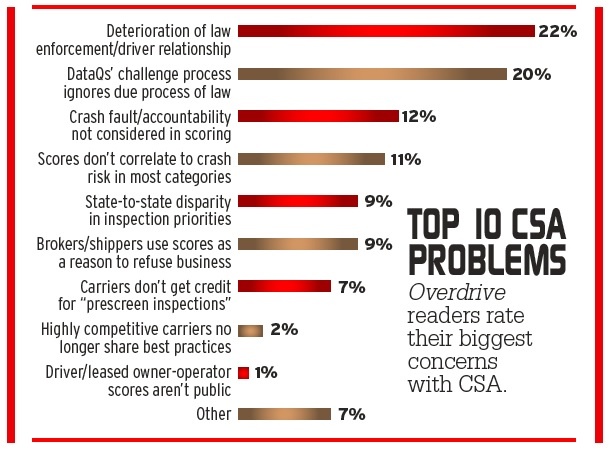
CSA stands for compliance, safety and accountability. The scoring happens as a result of an FMCSA initiative intended to improve the safety, fatalities, crashes and injuries for all interstate carriers who have a US DOT number. However,CSA scores aren't made public to everyone, which clouds the details on how it truly impacts your fleet. What can you do to improve your score?
Your CSA Score: How It Works

First, the FMCSA uses the Safety Measurement System or SMS for short, as a means of scoring you. It analyzes the data collected from crash reports, inspections and violations to highlight and monitor the safety problems specific to each carrier.
After this gets done, the data gets organized into seven separate categories called Behavior Analysis and Safety Improvement Categories. The SMS will first group each of the carriers into those who had a similar number of safety events. It uses this to rank and assign the carriers a percentile and prioritize each of them for an intervention.
This system could actually change within the next couple years to move into a more scientific method, which could play more to your benefit.
Who Sees Your CSA Score?
Not every aspect of the CSA score will be made public, and in particular, the hazardous materials compliance and crash indicator will not be seen. However, insurance companies, law enforcement, shippers and employers will all have access to certain components of a CSA score, and they will use the information to measure your fleet's riskiness.
An insurance company that does this, for example, could raise or lower your premiums depending on your score. You can view your CSA score here.
Why Your CSA Score Matters
Your CSA score counts because carriers with a good score will face fewer audits and fewer inspections. In addition, they will inspire greater trust from businesses and shippers, and they can even hire better drivers while potentially paying a lower insurance rate.
What Can You Do to Help Your CSA Score Along?
To start, check to make sure your fleet doesn't make common mistakes that could be avoided. For example, the most common mistake is roadside violations like, "Outdated Logs" and "Form and Manner." An outdated log can take five out of your potential 10 points. Other common five-point roadside violations include:
- Operating an out-of-service vehicle
- Driving a vehicle after it was declared out of service
Meanwhile, some of the 10-point violations against your CSA score include:
- Reckless driving
- Speeding 15 mph over the speed limit
- Talking on a phone while using a CMV
- Speeding through a construction zone

If you want to improve your CSA score, you can download a smartphone-based fleet GPS tracking app to help detect whenever your drivers have violated speeding laws, driven recklessly or used their mobile phone in the process. Without the app, changing their behavior can be difficult. However, it's worth tracking because these violations will lower your CSA score and cost you money over the long term.
CSA scores look at the last 24 months of data for your fleet. To improve your score, your best bet is to go through with incremental improvements at the organization to have a better record. Getting road smart about your CSA score can lead to further benefits in the future that make it worthwhile.
Sometimes companies have rewarded drivers up to $300 for having a clean CSA score because in the long run, this will save them even more money, and it provides good drivers with incentive for continuing to drive safely and responsibly on the road. If you'd like to learn more, Wilmar Inc can help. To get the benefits of what we have to offer, contact us today!







